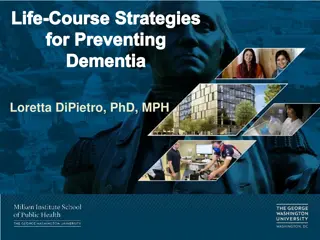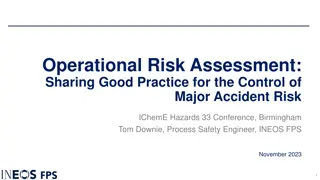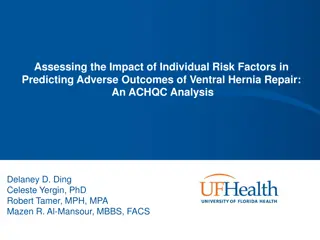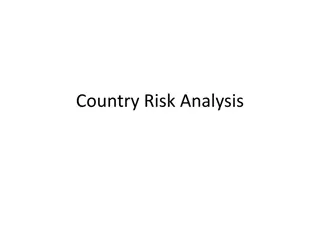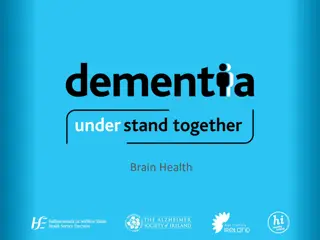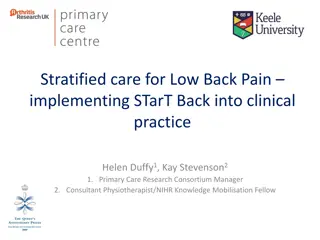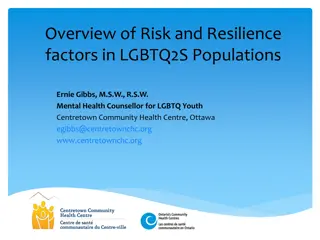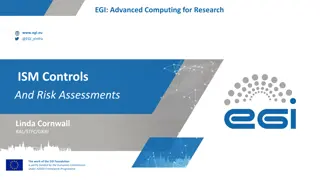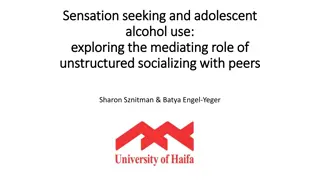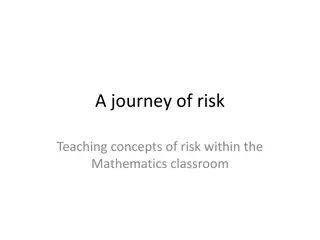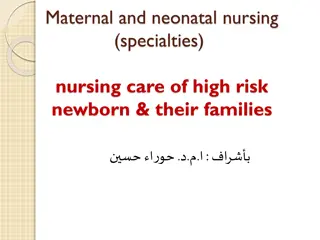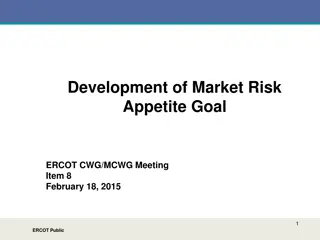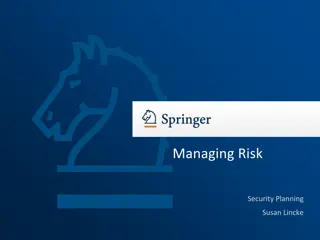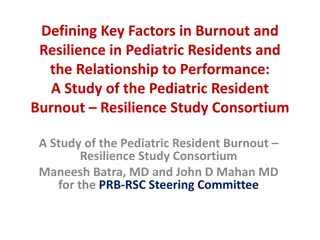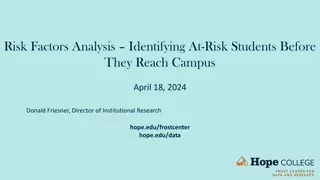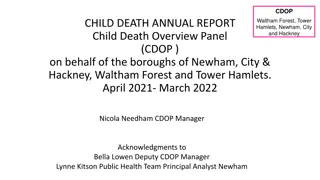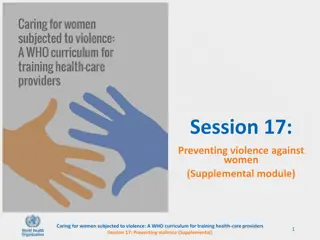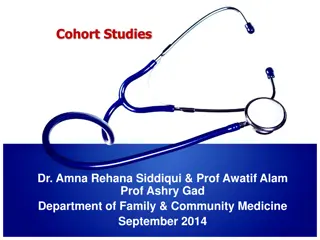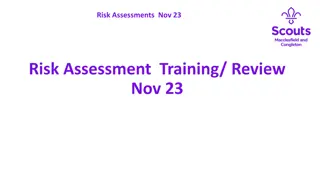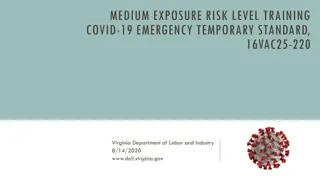Understanding Population Health Management for Better Health Outcomes
Population Health Management (PHM) integrates various healthcare services to improve the health and wellbeing of a defined population using evidence-based strategies. It focuses on addressing modifiable health determinants, achieving healthcare aims, and enhancing long-term health outcomes through e
3 views • 31 slides
Understanding Risk Management in Environmental Geography and Disaster Management
Risk management in environmental geography and disaster management involves assessing the potential losses from hazards, evaluating vulnerability and exposure, and implementing strategies to mitigate risks. It includes calculating risk, dealing with risk through acceptance, avoidance, reduction, or
1 views • 10 slides
Introduction to Flood Risk Assessment with HEC-FDA Overview
This presentation delves into flood risk assessment using HEC-FDA software, covering topics such as defining flood risk, components of uncertainty, consequences of flood risk, and methods to assess flood risk including hydrology, hydraulics, geotechnical, and economics. It explores the intersection
6 views • 39 slides
Understanding Non-Communicable Diseases and Prevention Strategies
Medical officer Dr. Richard Ayebare discusses non-communicable diseases (NCDs), highlighting their impact, common types in Uganda, cardiovascular risks, and modifiable vs. non-modifiable risk factors. Learn about the definition, worldwide picture, complications, and prevention methods of NCDs for a
0 views • 17 slides
Strategies for Preventing Dementia: A Comprehensive Overview
Dementia is a complex and multifactorial disease with significant societal and economic impacts. This comprehensive overview discusses the prevalence of dementia, modifiable risk factors, and preventive pathways across the life course. By addressing factors such as education, physical activity, and
4 views • 34 slides
Understanding Pneumonia: Causes, Classification, and Risk Factors
Pneumonia is an infection of the lower respiratory tract that can be classified anatomically and etiologically. The common causes include bacterial, viral, and fungal pathogens, as well as aspiration pneumonia. Factors such as immune deficiency, overcrowding, and poor hygiene can increase the risk o
10 views • 37 slides
Operational Risk Assessment for Major Accident Control: Insights from IChemE Hazards 33 Conference
This content provides valuable insights into the importance of Operational Risk Assessment (ORA) in managing major accident risks in high hazard industries. It covers the necessity of ORA, identifying changes, risk assessment, and key success factors. Real-life examples like the Buncefield Terminal
0 views • 22 slides
Analysis of Individual Risk Factors in Ventral Hernia Repair Outcomes
This study explores the impact of various risk factors on predicting adverse outcomes of ventral hernia repair using data from the Abdominal Core Health Quality Collaborative (ACHQC). The research aims to quantify and compare the influence of different factors, hypothesizing that hernia- and procedu
0 views • 14 slides
Understanding Country Risk Analysis in International Business
Country risk analysis is crucial for multinational corporations (MNCs) to assess the potential impact of a country's environment on their financial outcomes. It includes evaluations of political and economic risks in foreign operations. Sovereign risk, political risk characteristics, and factors are
1 views • 61 slides
Understanding Dementia Risk Factors and Brain Health
Learn about the 12 risk factors associated with dementia, focusing on how addressing these factors can reduce the risk by up to 40%. Discover the overlapping risks with heart disease and stroke, as well as specific preventive measures for maintaining brain health. Explore key strategies such as mana
1 views • 9 slides
Almost Half of Cancer Deaths and 40
The findings indicate that 40 percent of cancer cases and nearly half of cancer deaths in the United States can be attributed to modifiable risk factors.
0 views • 2 slides
Project Risk Management Fundamentals: A Comprehensive Overview
Project risk management involves minimizing potential risks and maximizing opportunities through processes such as risk management planning, risk identification, qualitative and quantitative risk analysis, risk response planning, and risk monitoring and control. Quantitative risk analysis assesses t
0 views • 41 slides
Implementing STarT Back for Stratified Care in Low Back Pain Management
Helen Duffy and Kay Stevenson discuss the implementation of STarT Back, a screening tool designed to stratify low back pain patients for matched treatments based on modifiable risk factors. The tool is quick, validated, and helps clinicians identify high, medium, and low-risk patients for tailored p
0 views • 21 slides
Interdisciplinary Prehabilitation Pilot for Elective Colorectal Surgeries at Our Lady of Lourdes Hospital
Our Lady of Lourdes Hospital in Drogheda initiated an interdisciplinary prehabilitation pilot program for patients undergoing elective colorectal surgeries. The program aims to reduce length of stay by addressing modifiable risk factors and optimizing patients' physiological reserve. By targeting po
0 views • 4 slides
Risk and Resilience Factors in LGBTQ2S Populations
This presentation by Ernie Gibbs, a Mental Health Counsellor, explores risk and resilience factors impacting LGBTQ2S youth. It delves into terminology, risk factors like depression and violence, as well as resilience factors such as family acceptance and access to medical transition services. The di
0 views • 10 slides
Pennsylvania Risk Assessment: A Comprehensive Overview
This document explores the Pennsylvania risk assessment process, focusing on factors, techniques, and writing effective summaries. It covers learning objectives, agenda details, and the Pennsylvania Model Risk Assessment Form. Key points include understanding risk factors, making objective judgments
2 views • 8 slides
Understanding Modifications in Legal Judgments
Dive into the complexities of modifying legal judgments post-Final Judgment, including insightful tips on maintaining accurate records, addressing parenting issues, equitable distribution, and alimony considerations. Explore the intricacies of modifiable aspects and learn about necessary findings fo
0 views • 29 slides
Understanding Hypertension: A Comprehensive Overview
High blood pressure (BP) is considered a trait rather than a specific disease, with risks increasing with age. Antihypertensive therapy has shown to reduce the incidence of stroke and coronary artery disease. Managing hypertension effectively involves a holistic approach targeting modifiable risk fa
0 views • 115 slides
Understanding Risk Concepts and Management Strategies in Finance
Explore the essential concepts of risk in finance, such as risk definition, risk profiles, financial exposure, and types of financial risks. Learn about risk vs. reward trade-offs, identifying risk profiles, and tools to control financial risk. Understand the balance between risk and return, and the
0 views • 18 slides
Risk and Return Assessment in Financial Management
This comprehensive presentation explores the intricacies of risk and return assessment in the realm of financial management. Delve into understanding risk concepts, measuring risk and return, major risk categories, and the impact of risk aversion on investment decisions. Gain insights into the manag
0 views • 62 slides
Risk Management and Security Controls in Research Computing
The European Grid Infrastructure (EGI) Foundation conducts risk assessments and implements security controls in collaboration with the EOSC-hub project. The risk assessments involve evaluating threats, determining likelihood and impact, and recommending treatment for high-risk threats. Results from
0 views • 13 slides
Risk Management & MPTF Portfolio Analysis at Programme Level for UN Somalia
This session delves into the world of risk management and portfolio analysis at the programme/project level, specifically focusing on the Risk Management Unit of the United Nations Somalia. It covers enterprise risk management standards, planned risk management actions, the role of RMU, joint risk m
0 views • 30 slides
Alcohol and Cancer Risk: Understanding the Links
Alcohol consumption is linked to an increased risk of various cancers, including mouth, throat, esophagus, breast, liver, and colorectal cancers. Factors such as ethanol, acetaldehyde, nutrient absorption, estrogen levels, and liver cirrhosis play a role in this risk. Even light drinking can elevate
0 views • 17 slides
Ecological Factors and Climatic Influences on Plant Life
Ecological factors play a crucial role in shaping the environment for organisms to thrive. This includes living (biotic) and non-living (abiotic) components like climatic factors, edaphic factors, topographic factors, and biotic factors. Climatic factors such as light, temperature, water, wind, and
0 views • 14 slides
Understanding Adolescent Alcohol Use and Prevention Strategies
Exploring the relationship between sensation seeking, unstructured socializing, and adolescent alcohol use, this study reveals the underlying risk factors and emphasizes the importance of preventive measures to mitigate the negative consequences associated with heavy and frequent alcohol consumption
0 views • 18 slides
Understanding Dementia: Causes, Symptoms, and Management Overview
Dementia is a clinical syndrome involving memory, cognitive, and behavioral difficulties leading to impairment in daily activities. This session covers diagnosis, risk factors, types of dementia, case studies, management strategies, and the impact of dementia on driving. Learn about the stages, inci
0 views • 65 slides
Understanding Risk Concepts in the Mathematics Classroom
Risk is a concept integral to decision-making in various aspects of life. This resource explores how risk is defined in the real world, its relevance in the classroom, and strategies for teaching risk literacy to students. It delves into the multiple definitions of risk, risk analysis, and the emoti
0 views • 62 slides
High-Risk Newborn Nursing Care and Factors
Maternal and neonatal nursing specialties focus on providing care for high-risk newborns and their families, who face conditions endangering the neonate's survival. Factors contributing to high-risk newborns include high-risk pregnancies, maternal medical illnesses like diabetes, labor complications
0 views • 25 slides
Understanding Organizational Risk Appetite and Tolerance
Explore the development of market risk appetite goals and how to define and establish organizational risk tolerance. Learn about the Classic Simplified View of Risk Tolerance and different methods to determine risk appetite. Discover the importance of assessing market risk impact and aligning risk t
0 views • 8 slides
Developing a Risk Appetite Culture: Importance and Framework
Risk management plays a critical role in the success of corporations, with strategy and risk being intertwined. This presentation delves into definitions of key terms such as risk appetite, the Risk Appetite Cycle, characteristics of a well-defined risk appetite, and the importance of expressing ris
0 views • 31 slides
Security Planning and Risk Management Overview
This content provides an in-depth exploration of managing risk, security planning, and risk appetite in the context of cybersecurity. It covers essential concepts such as risk management process, threat types, risk analysis strategies, vulnerability assessment, and risk mitigation techniques. The ma
0 views • 73 slides
Pediatric Resident Burnout & Resilience Study Consortium Overview
This study aims to investigate the factors influencing burnout and resilience in pediatric residents, with a focus on enhancing well-being and performance. The Pediatric Resident Burnout Resilience Study Consortium (PRB-RSC) involves over 20 residency programs in the U.S. to examine the epidemiology
0 views • 18 slides
Risk Factors Analysis: Identifying At-Risk Students Before They Reach Campus
Risk Factors Analysis aims to identify students at risk of attrition before they even arrive on campus by evaluating academic, financial, minority, and first-generation factors. The method involves choosing specific risk factors, tracking historical prevalence, calculating relative risk, and predict
0 views • 15 slides
Child Death Annual Report Overview in North East London Boroughs
This report presents data and insights from the Child Death Overview Panel (CDOP) for the boroughs of Waltham Forest, Tower Hamlets, Newham, City, and Hackney in North East London. It covers the period from April 2021 to March 2022, highlighting notifications and reviews of child deaths, modifiable
0 views • 28 slides
Cross-National & Cross-Cultural Risk Factors for Offending
Explore key risk factors for offending across nations & cultures, analyzing homicide rates, structural differences, individual/family factors, and the generalizability of crime risk factors. Learn about findings related to impulsivity, achievement, conduct problems, family supervision, parenting sty
0 views • 13 slides
Understanding Risk and Protective Factors in Preventing Violence Against Women
Violence against women is preventable, and understanding risk and protective factors is crucial in developing effective prevention strategies. This WHO curriculum focuses on enhancing protective factors, minimizing risk, and implementing prevention programs to address violence against women. It high
0 views • 22 slides
Annual Child Death Overview Panel Report 2022-2023 for Calderdale, Kirklees, and Wakefield
The Annual Child Death Overview Panel Report for Calderdale, Kirklees, and Wakefield highlights the review process for unexpected and expected child deaths. The report emphasizes the importance of learning from each death to prevent similar tragedies in the future, sharing findings regionally and na
0 views • 27 slides
Understanding Cohort Studies and Disease Risk in Epidemiology
Cohort studies play a crucial role in epidemiology, allowing researchers to assess the relationship between exposure and disease risk. By describing different study designs, calculating risks, and understanding population at risk, valuable insights are gained to prevent adverse health outcomes. Risk
0 views • 37 slides
Comprehensive Risk Assessment Training Overview
In this risk assessment training session held on November 23, participants reviewed the process of writing and reviewing risk assessments to enhance the quality of assessments for safer scouting experiences. The training aimed to improve leaders' skills and confidence in risk assessment practices wh
0 views • 37 slides
Workplace Exposure Risk Levels Training and Standards Overview
This content provides detailed information on exposure risk levels in the workplace, including medium, low, high, and very high risk classifications. It explains the requirements and training needed for each risk level, as well as how to determine exposure risk levels based on tasks, work environmen
0 views • 25 slides




